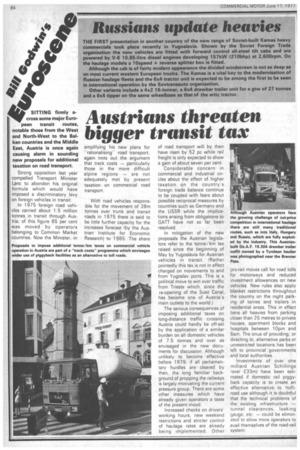Austrians threaten
Page 86

If you've noticed an error in this article please click here to report it so we can fix it.
bigger transit tax
li
4 _ . . . . SITTING firmly across some major European transit routes, notable those from the West and North-West to the Balkan countries and the Middle East, Austria is once again causing alarm in sounding new proposals for additional taxation on road transport.
Strong opposition last year compelled Transport Minister Lanc to abandon his original formula which would have imposed a discriminatory levy on foreign vehicles in transit.
In 1975 foreign road vehicles carried about 1.5 million tonnes in transit through Austria; of this figure 85 per cent was moved by operators belonging to Common Market countries. Now the Minister, in
amplifying his new plans for -rationalisong" road transport, again trots out the argument that track costs -particularly those in the more difficult alpine regions -are not adequately met by present taxation on commercial road transport.
With road vehicles responsiNe for the movement of 28m tonnes over trunk and transit roads in 1975 there is said to be little further capacity for the increases forecast (by the Austrian Institute for Economic Research) to 1985. The share of road transport will by then have risen by 52 pc while rail freight is only expected to show a gain of about seven per cent.
Considerable concern in commercial and industrial circles about the effect of higher taxation on the country's foreign trade balance continue to be coupled with fears about possible reciprocal measures by countries such as Germany and the USSR while the implications arising from obligations to GATT have not so far been resolved.
In mitigation of the new proposals the Austrian legislators refer to the tonne/km tax raised since the beginning of May by Yugoslavia for Austrian vehicles in transit. (Rather pointedly this tax is not in effect charged on movements to and from Yugoslav ports. This is a political move to win over traffic from Trieste which, since the re-opening of the Suez Canal, has become one of Austria's main outlets to the world.)
The serious consequences of imposing additional taxes on long-distance traffic crossing Austria could hardly be off-set by the application of a similar burden on all domestic vehicles of 7.5 tonnes and over as envisaged in the new documents for discussion. Although unlikely to become effective before 1979, if all parliamentary hurdles are cleared by then, the long familiar background of propping the railways is largely motivating the current pressure group. There are some other measures which have already given operators a taste of the present mood.
Increased checks on drivers' working hours, new weekend restrictions and stricter control of haulage rates are already being implemented. Other pro-rail moves call for road tolls for motorways and reduced investment allowances on new vehicles. New rules also apply blanket restrictions throughout the country on the night parking of lorries and trailers in residential areas. This in effect bans all heavies from parking closer than 25 metres to private houses, apartment blocks and hospitals between 1 Opm and Sam. The onus of providing, or directing to, alternative parks or unrestricted locations has been left to provincial governments and local authorities.
Investments of over one milliard Austrian Schillings over £33m) have been estimated if domestic rail piggyback capacity is to create an effective alternative to ftollyroad use although it is doubtful that the technical problems of the existing infrastructure -tunnel clearances, loaking gauge, etc. -could be eliminated to allow more operators to avail themselves of the road-rail system.












































































































































































